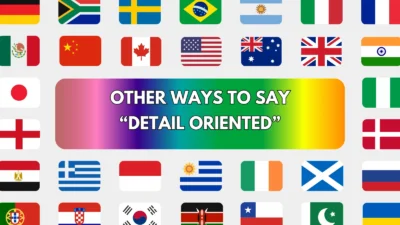Calling someone a “quick learner” is a great compliment — it recognizes their ability to absorb information fast and apply it effectively. But when writing a resume, giving feedback, or praising a teammate, repeating this exact phrase can sound generic or overused.
To keep your language fresh, powerful, and tailored to the situation, here are 25 smart alternatives to “quick learner” — each with clear usage tips and real-world examples.
1. Fast to pick things up
Meaning:
Describes someone who quickly understands and adapts to new information.
Detailed Explanation:
This is a casual, conversational way to recognize someone’s learning speed.
Scenario Example:
She’s fast to pick things up — you only need to show her once.
Best Use:
Informal praise, team discussions.
Tone:
Friendly, appreciative.
2. Rapid learner
Meaning:
A person who learns at a faster-than-average pace.
Detailed Explanation:
A more polished version of “quick learner” that sounds good in resumes and reviews.
Scenario Example:
He’s a rapid learner and adapted to the software in no time.
Best Use:
Resumes, formal evaluations.
Tone:
Professional, clear.
3. Grasp new concepts quickly
Meaning:
Capable of understanding new ideas or tasks with ease.
Detailed Explanation:
This phrase focuses on comprehension rather than just speed.
Scenario Example:
She grasps new concepts quickly and asks smart follow-up questions.
Best Use:
Interviews, employee feedback.
Tone:
Intelligent, thoughtful.
4. Learns on the fly
Meaning:
Able to pick up knowledge or skills while actively doing something.
Detailed Explanation:
Useful to describe someone who doesn’t need long training sessions.
Scenario Example:
He learns on the fly, which is perfect for fast-paced projects.
Best Use:
Startups, agile teams.
Tone:
Energetic, modern.
5. Picks up skills effortlessly
Meaning:
Learns new skills with little difficulty.
Detailed Explanation:
Conveys ease and natural talent in learning.
Scenario Example:
She picks up skills effortlessly — it’s like second nature to her.
Best Use:
Performance reviews, casual compliments.
Tone:
Impressed, warm.
6. Adaptable and eager to learn
Meaning:
Quick to adjust and open to gaining new knowledge.
Detailed Explanation:
This describes both speed and mindset, great for job descriptions.
Scenario Example:
We’re looking for someone adaptable and eager to learn.
Best Use:
Hiring materials, cover letters.
Tone:
Positive, inviting.
7. Absorbs information quickly
Meaning:
Takes in knowledge and retains it well.
Detailed Explanation:
Great for describing someone who processes and remembers facts fast.
Scenario Example:
He absorbs information quickly and applies it effectively.
Best Use:
Academic or training environments.
Tone:
Informative, confident.
8. Naturally curious
Meaning:
Always looking to learn and explore new ideas.
Detailed Explanation:
Focuses on the inner drive to learn, not just speed.
Scenario Example:
She’s naturally curious, always asking great questions.
Best Use:
Creative industries, education.
Tone:
Warm, thoughtful.
9. Quick to adapt
Meaning:
Adjusts fast to changes or new challenges.
Detailed Explanation:
Highlights flexibility and readiness to learn in dynamic environments.
Scenario Example:
He’s quick to adapt — you can count on him in uncertain situations.
Best Use:
Tech, startup, fast-paced industries.
Tone:
Agile, professional.
10. Sharp and responsive
Meaning:
Mentally alert and fast at understanding or reacting.
Detailed Explanation:
This praises both intellect and reactivity in one phrase.
Scenario Example:
She’s sharp and responsive — always one step ahead.
Best Use:
Team reviews, leadership comments.
Tone:
Smart, sharp.
11. Learns by doing
Meaning:
Gains knowledge best through action or experience.
Detailed Explanation:
A practical learner who improves through real-world practice.
Scenario Example:
He learns by doing and quickly masters new tools.
Best Use:
Hands-on jobs, training assessments.
Tone:
Practical, focused.
12. Self-starter with a growth mindset
Meaning:
Initiates learning independently and embraces challenges.
Detailed Explanation:
Modern, motivational language used in professional environments.
Scenario Example:
We value self-starters with a growth mindset on this team.
Best Use:
Job descriptions, team onboarding.
Tone:
Empowering, modern.
13. Learns things in no time
Meaning:
Very fast at learning — almost instantaneously.
Detailed Explanation:
An informal, enthusiastic way to express speed in learning.
Scenario Example:
She learns things in no time — a real asset to the team.
Best Use:
Casual compliments, feedback.
Tone:
Lively, admiring.
14. Picks things up like a pro
Meaning:
Handles new tasks quickly and with expertise.
Detailed Explanation:
Adds a sense of mastery along with quickness.
Scenario Example:
He picked up the system like a pro within two days.
Best Use:
Peer praise, work reviews.
Tone:
Confident, upbeat.
15. Highly trainable
Meaning:
Easily taught and responsive to training.
Detailed Explanation:
A phrase often used in job hiring and HR contexts.
Scenario Example:
She’s highly trainable and open to feedback.
Best Use:
Resumes, HR assessments.
Tone:
Professional, concise.
16. Catches on fast
Meaning:
Learns new tasks or patterns quickly.
Detailed Explanation:
Informal and friendly, this phrase is great for spoken praise.
Scenario Example:
He catches on fast — we barely had to explain twice.
Best Use:
Team talks, training feedback.
Tone:
Conversational, encouraging.
17. Learns without needing repetition
Meaning:
Understands quickly and remembers well.
Detailed Explanation:
Describes efficiency in learning and retention.
Scenario Example:
She learns without needing repetition — very efficient.
Best Use:
Performance reviews, coaching.
Tone:
Professional, impressed.
18. Intellectually agile
Meaning:
Able to think quickly and flexibly.
Detailed Explanation:
Suits high-level roles or academic praise.
Scenario Example:
His intellectually agile mind is perfect for strategic thinking.
Best Use:
Academic, leadership, strategy roles.
Tone:
Intellectual, refined.
19. Rapid processor
Meaning:
Processes and uses information very quickly.
Detailed Explanation:
A tech-like description, useful in digital or data-driven fields.
Scenario Example:
She’s a rapid processor — great for real-time decision-making.
Best Use:
Tech, fast-paced roles.
Tone:
Analytical, efficient.
20. Mentally quick
Meaning:
Thinks and learns with speed and sharpness.
Detailed Explanation:
Compliments both brainpower and adaptability.
Scenario Example:
He’s mentally quick — ideal for client-facing roles.
Best Use:
Sales, consulting, interviews.
Tone:
Smart, confident.
21. Shows initiative in learning
Meaning:
Takes charge of their own learning journey.
Detailed Explanation:
Focuses on self-motivation, not just speed.
Scenario Example:
She shows initiative in learning new tools on her own.
Best Use:
Growth-focused roles, coaching.
Tone:
Encouraging, proactive.
22. Processes feedback quickly
Meaning:
Understands and applies feedback with ease.
Detailed Explanation:
This shows openness and fast learning from corrections or suggestions.
Scenario Example:
He processes feedback quickly and applies it the next day.
Best Use:
Workplace development.
Tone:
Positive, coachable.
23. Learns independently
Meaning:
Capable of teaching oneself without supervision.
Detailed Explanation:
Ideal for remote or solo work where guidance is minimal.
Scenario Example:
She learns independently and never waits for direction.
Best Use:
Self-driven jobs, freelance work.
Tone:
Confident, capable.
24. Picks up on details quickly
Meaning:
Quickly notices and understands the small stuff.
Detailed Explanation:
Great for roles that require precision and attentiveness.
Scenario Example:
He picks up on details quickly — a huge help on technical tasks.
Best Use:
Detail-oriented work, QA.
Tone:
Precise, sharp.
25. Adapts quickly to new tools or systems
Meaning:
Learns software, technology, or platforms with ease.
Detailed Explanation:
A practical, skill-specific version of “quick learner.”
Scenario Example:
She adapts quickly to new systems — barely needed onboarding.
Best Use:
IT, remote onboarding, admin roles.
Tone:
Functional, practical.
Conclusion
Whether you’re updating your resume, praising a team member, or writing a professional bio, using a strong alternative to “quick learner” can make your message more specific and memorable. With these 25 expressions, you’ll have the perfect way to describe intelligence, adaptability, and a sharp learning mindset — every time.

Naz Fatima is an author at Saypadia who specializes in writing clear, relatable, and reader-friendly content about language, expressions, and modern terminology. She enjoys breaking down meanings with real-life context so readers can quickly understand and apply them. Naz’s work reflects a strong commitment to clarity, accuracy, and helping users find quick answers without confusion.




